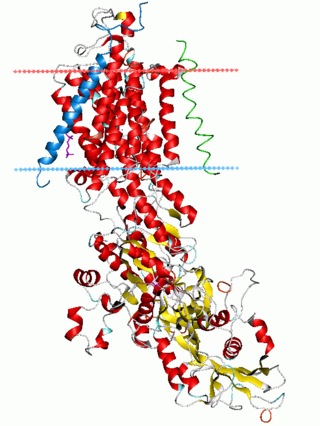
The sodium–potassium pump is an enzyme found in the membrane of all animal cells. It performs several functions in cell physiology.
Israel Hanukoglu is a Turkish-born Israeli scientist. He is a full professor of biochemistry and molecular biology at Ariel University and former science and technology adviser to the prime minister of Israel (1996–1999). He is founder of Israel Science and Technology Directory.

Established in 1870 as the Colombo Medical School, the Faculty of Medicine of the University of Colombo, is the second oldest medical school in South Asia. It is considered to be the top most medical faculty in the country which requires the highest entry qualification in GCE Advanced Level examination.
Derek Ashworth Denton was an Australian scientist who elucidated the regulation of electrolytes in extracellular fluid, the hormones controlling this regulation, particularly aldosterone, and the instinctive behaviours controlling intake of water and salts. He was cited in 1995 at election to the U.S. National Academy of Sciences as the world’s leading authority on the regulation of salt and water metabolism and relevant endocrine control mechanisms. He was one of Australia’s most eminent scientists.

Raphael Mechoulam was a Bulgarian-born Israeli organic chemist and a professor in the Department of Natural Materials at the School of Pharmacy in the Faculty of Medicine of the Hebrew University of Jerusalem. Mechoulam served as Rector of the university from 1979-1982. He was elected to the Israel Academy of Sciences and Humanities in 1994 and served as its scientific chair from 2007-2013. He was a recipient of the Israel Prize for Chemistry Research in 2000 and the Harvey Prize for 2019-2020.

Aharon Razin was an Israeli biochemist.
Madhu Sudan Kanungo was an Indian scientist in the field of gerontology and neuroscience as well as a teacher of molecular biology and biochemistry. He is known for his theories on how gene expression changes with age and the role of this phenomenon in ageing, which is a widely accepted as "Gene expression theory of Aging". In recognition of his contributions, he was awarded India's fourth highest civilian award, Padma Shri in 2005. He held the post of BHU Emeritus professor in zoology at the Banaras Hindu University and was also the Chancellor, Nagaland University till his death.

Peretz Lavie was the 16th president of the Technion - Israel Institute of Technology, having taken the position on 1 October 2009 through September 2019. Lavie, an expert in the psychophysiology of sleep and sleep disorders, heads the Technion Sleep Laboratory and holds the André Ballard Chair in Biological Psychiatry. Between 1993 and 1999 he served as dean of the Rappaport Faculty of Medicine, and between 2001 and 2008, as the Technion’s vice president for resource development and external relations.
Mahdi Hasan was an anatomist from Uttar Pradesh, India.

Moussa B. H. Youdim is an internationally renowned Israeli neuroscientist specializing in neurochemistry and neuropharmacology. He is the discoverer of both monoamine oxidase (MAO) B inhibitors l-deprenyl (Selegiline) and rasagiline (Azilect) as anti-Parkinson drugs which possess neuroprotective activities. He is currently professor emeritus at Technion - Faculty of Medicine and President of Youdim Pharmaceuticals.
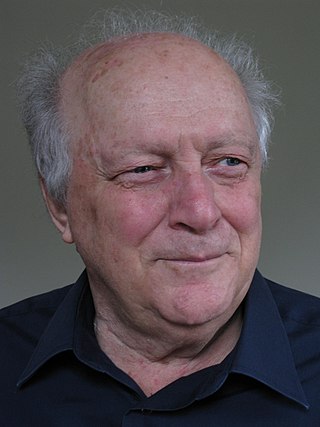
Moshe Abeles is an Israeli brain researcher and neurophysiologist. He is emeritus professor at the Hebrew University in Jerusalem and at the Life Science Faculty of Bar Ilan University in Ramat Gan.
Institute for Medical Research, Israel-Canada (IMRIC) is a research institute affiliated with the Faculty of Medicine of the Hebrew University of Jerusalem.

Yosef Gruenbaum is an Israeli researcher, academic, biochemist and professor in medicine based in Jerusalem, Israel. He is known for his research on nuclear lamins and their associated proteins in health and disease. He was the Chairman of the AlexanderSilberman Institute of Life Sciences at the Hebrew University of Jerusalem and is an adjunct professor at the Northwestern University, Chicago.
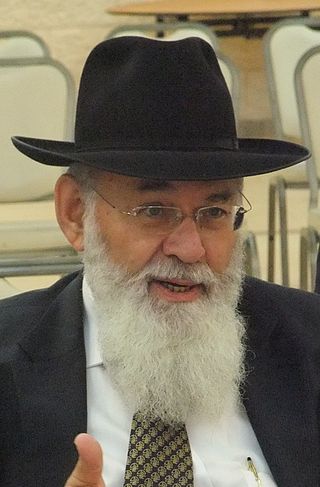
Avraham Steinberg is an Israeli medical ethicist, pediatric neurologist, rabbi and editor of Talmudic literature.
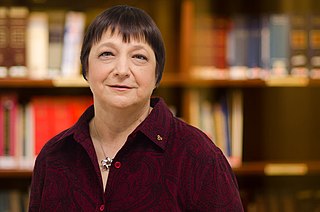
Mimi Ajzenstadt is an Israeli criminologist who was named the Mildred and Benjamin Berger Chair in Criminology at The Hebrew University of Jerusalem, and is the President of the Open University of Israel.
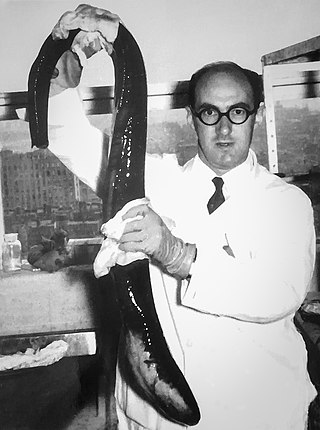
Ronald Whittam was an English research scientist in the field of cell physiology. He conducted important studies on the mechanism of active transport of ions across animal membranes and its relation to cellular metabolism. Whittam was the inaugural Chair in Physiology at the University of Leicester, where he was subsequently an Emeritus Professor.
Jack Gross (1921-1994) was a Canadian-Israeli endocrinologist and one of the co-discoverers of Triiodothyronine (T3).

Gilad Haran is an Israeli biophysicist and physical chemist, a full professor at the Faculty of Chemistry in the Weizmann Institute of Science, and its former dean. An expert in molecular machines. Laureate of Weizmann Prize (2017) and Nakanishi Prize (2023).
Eliezer Shalev is an Israeli gynecologist and current President of Tel Hai Academic College. He also serves as Chairman of the Israeli Ministry of Health National Council for Gynecology, Neonatology and Genetics.

Assaf Friedler is an Israeli organic chemist and biochemist who is a full professor at the Institute of Chemistry in the Faculty of Mathematics and Natural Sciences, the Hebrew University of Jerusalem. He is the current dean of the faculty, the chairman of the Hebrew University for the Youth, and a former vice-rector of the Hebrew University.













